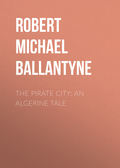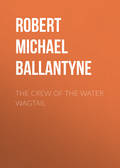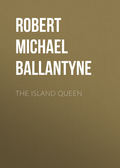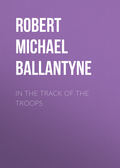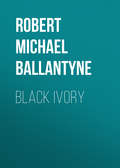
Robert Michael Ballantyne
Freaks on the Fells: Three Months' Rustication
Story 1—Chapter 16.
The Effects of Compasses
The first few weeks of the Sudberrys’ residence in their Highland home were of an April cast—alternate sunshine and shower. Sometimes they had a day of beaming light from morning till night; at other times they had a day of unmitigated rain, or, as Mr Sudberry called it, “a day of cats and dogs;” and occasionally they had a day which embraced within its own circuit both conditions of weather—glorious bursts of sunshine alternating with sudden plumps of rain.
Thus far the weather justified and strengthened the diverse opinions of both husband and wife.
“Did I not tell you, my love, that the climate was charming?” was Mr Sudberry’s triumphant remark when a dazzling blaze of light would roll over flood and fell, and chase the clouds away.
“There, didn’t I say so?” was the withering rejoinder of Mrs Sudberry, when a black cloud rolled over the sky and darkened the landscape as with a wipe of ink.
Hitherto victory leaned decidedly to neither side, the smile of triumph and the humbled aspect of defeat rested alternate on either countenance, so that both faces taken together formed a sort of contradictory human barometer, which was not a bad one—at all events it was infinitely superior to that instrument of the banjo type, which Mr Sudberry was perpetually tapping in order to ascertain whether or not its tendencies were dropsical.
When father was up at “set fair,” mother was certain to be depressed, inclining to much rain; yet, strangely enough, it was on such occasions very dry! When mother was “fair,” (barometrically speaking, of course), father was naturally down at “changeable”! Yet there was wonderful contradiction in the readings of this barometer; for, when mother’s countenance indicated “much rain,” father sometimes went down to “stormy,” and the tails of his coat became altogether unmanageable.
But, towards the middle of the holidays, father gained a decided victory. For three weeks together they had not a drop of rain—scarcely a cloud in the sky; and mother, although fairly beaten and obliged to confess that it was indeed splendid weather, met her discomfiture with a good grace, and enjoyed herself extremely, in a quiet way.
During this bright period the Sudberry Family, one and all, went ahead, as George said, “at a tremendous pace.” The compasses having arrived, Mr Sudberry no longer laid restrictions on the wandering propensities of his flock but, having given a compass to each, and taught them all the use of it, sent them abroad upon the unexplored ocean of hills without fear. Even Jacky received a compass, with strict injunctions to take good care of it. Being naturally of an inquiring disposition, he at once took it to pieces, and this so effectually that he succeeded in analysing it into a good many more pieces than its fabricator had ever dreamed of. To put it together again would have taxed the ingenuity of the same fabricator—no wonder that it was beyond the power of Jacky altogether. But this mattered nothing to the “little darling,” as he did not understand his father’s learned explanation of the uses of the instrument. To do Mr Sudberry justice, he had not expected that his boy could understand him; but he was aware that if he, Jacky, did not get a compass as well as the rest of them, there would be no peace in the White House during that season. Moreover, Jacky did not care whether he should get lost or not. In fact, he rather relished it; for he knew that it would create a pleasant excitement for a time in the household, and he entertained the firm belief that McAllister and his men could find any creature on the hills, man or beast, no matter how hopelessly it should be lost.
There being, then, no limit to the wanderings of the Sudberrys, they one and all gave themselves over deliberately to a spirit of riotous rambling. Of course they all, on various occasions, lost themselves, despite the compasses; but, having become experienced mountaineers, they always took good care to find themselves again before sunset. George and Fred candidly declared that they preferred to steer by “dead reckoning,” and left their compasses at home. Lucy always carried hers, and frequently consulted it, especially when in her father’s presence, for she was afflicted, poor girl, with that unfashionable weakness, an earnest desire to please her father even in trifles. Nevertheless, she privately confided to Fred one day that she was often extremely puzzled by her compass, and that she had grave doubts as to whether, on a certain occasion, when she had gone for a long ramble with Hector and Flora Macdonald, and been lost, the blame of that disaster was not due to her compass. Fred said he thought it was, and believed that it would be the means of compassing her final disappearance from the face of the earth if she trusted to it so much.
As for Mr Sudberry himself; his faith in the compass was equal to that of any mariner. The worthy man was, or believed himself to be, (which is the same thing, you know!) of profoundly scientific tendencies. He was aware, of course, that he had never really studied any science whatever; but he had dabbled in a number of them, and he felt that he had immense capacity for deep thought and subtle investigation. His mind was powerfully analytical—that’s what it was. One consequence of this peculiarity of mind was that he “took his bearings” on short and known distances, as well as on long venturesome rambles; he tested himself and his compass, as it were.
One day he had walked out alone in the direction of the village, four miles distant from the White House, whence the family derived their supplies. He had set out with his rod, (he never walked near the river without his rod), intending to take a cast in what he styled the “lower pools.” By degrees he fished so near to the village that he resolved to push forward and purchase a few books. Depositing rod and basket among the bushes, he walked smartly along the road, having previously, as a matter of course, taken his bearings from the village by compass. A flock of sheep met him, gazed at him in evident surprise, and passed on. At their heels came the collie dog, with his tongue out. It bestowed a mild, intelligent glance on the stranger, and also passed on. Close behind the dog came the shepherd, with plaid bonnet and thick stick.
“A fine day, friend,” said Mr Sudberry.
“Oo, ay, it is a fine day.”
He also passed on.
Another turn in the road, and Mr Sudberry met a drove of shaggy cattle, each cow of which looked sturdy and fierce enough for any ordinary bull; while the bull himself was something awful to look upon. There is nothing ladylike or at all feminine in the aspect of a Highland cow!
Mr Sudberry politely stepped to one side, and made way for them. Many of the animals paused for an instant, and gazed at the Englishman with profound gravity, and then went on their way with an air that showed they evidently could make nothing of him. The drover thought otherwise, for he stopped.
“Coot-tay to you, sir.”
“Good-day, friend, good-day. Splendid weather for the—for the—”
Mr Sudberry did not know exactly for which department of agriculture the weather was most favourable, so he said—“for the cattle.”
“Oo, ay, the w’ather’s no that ill. Can she tell the time o’ day?”
Out came the compass.
“West-nor’-west, and by—Oh! I beg your pardon,” (pulling out his watch and replacing the compass), “a quarter-past two.”
The drover passed on, and Mr Sudberry, chuckling at his mistake, took the bearings of a tall pine that grew on a distant knoll.
On gaining the outskirts of the village, Mr Sudberry felt a sensation of hunger, and instantly resolved to purchase a bun, which article he had now learned to call by its native name of “cookie.” At the same instant a bright idea struck him—he would steer for the baker’s shop by compass! He knew the position of the shop exactly—the milestone gave him the distance—he would lay his course for it. He would walk conscientiously with his eyes on the ground, except when it was necessary to refer to the compass, and he would not raise them until he stood within the shop. It would be a triumphant exhibition of the practical purposes, in a small way, to which the instrument might be applied.
Full of this idea, he took a careful observation of the compass, the sun, and surrounding nature; laid his course for the baker’s shop, which was on the right side of the village, and walked straight into the butcher’s, which lay on its left extremity. He was so much put out on lifting his eyes to those of the butcher, that he ordered a leg of mutton and six pounds of beefsteaks on the spot. The moment after, he recollected that two legs of mutton and a round of beef had been forwarded to the White House by coach the day before, and that there was a poached brace of moor-fowl in the larder at that moment; but, having given the order in a prompt, business tone of voice, he felt that he lacked moral courage to rescind it.
“Ye’ll ha’e frien’s comin’ to veesit ye,” observed the butcher, who was gifted with a peculiar and far-sighted faculty of “putting that and that together.”
“No; we have no immediate prospect of such a pleasure.”
“Ay? Hum! it’s wonderfu’ what an appeteet the hill air gives to strangers.”
“A tremendous appetite! Good-day, friend.”
Mr Sudberry said this heartily, and went off to the baker’s—by dead reckoning—discomfited but chuckling.
The butcher pondered and philosophised over the subject the remainder of the afternoon with much curiosity, but with no success. Had the wisdom of Plato been mingled with his Scotch philosophy, the compound reduced to an essential oil of investigative profundity, and brought to bear on the subject in question, he would have signally failed to discover the reason of the Sudberrys’ larder being crammed that week with an unreasonable quantity of butcher-meat.
Yes! during these three weeks of sunshine the Sudberrys made hay of their time as diligently as the McAllisters made hay of their grass, and the compasses played a prominent part in all their doings, and led them into many scrapes. Among other things, they led them to Glen Ogle. More of this in the next chapter.
Story 1—Chapter 17.
The Trip to Glen Ogle
Without entering into minute comparisons, it may be truly said that Glen Ogle is one of the grandest and wildest of mountain passes in the highlands of Perthshire. Unlike the Trossachs, which Sir Walter Scott has immortalised in his “Lady of the Lake,” Glen Ogle is a wild, rugged, rocky pass, almost entirely destitute of trees, except at its lower extremity; and of shrubs, except along the banks of the little burn which meanders like a silver thread down the centre of the glen. High precipitous mountains rise on either hand—those on the left being more rugged and steep than those on the right. The glen is very narrow throughout—a circumstance which adds to its wildness; and which, in gloomy weather, imparts to the spot a truly savage aspect. Masses of débris and fallen rocks line the base of the precipices, or speckle the sides of the mountains in places where the slopes, being less precipitous than elsewhere, have served to check the fallen matter; and the whole surface of the narrow vale is dotted with rocks of various sizes, which have bounded from the cliffs, and, overleaping every obstacle, have found a final resting-place on a level with the little stream.
The road follows the course of the stream at the foot of the glen; but, as it advances, it ascends the mountains on the right, and runs along their sides until the head of the pass is gained. Here it crosses, by means of a rude stone bridge, a deep chasm, at the bottom of which the waters of the burn leap and roar among chaotic rocks—a foretaste of the innumerable rushes, leaps, tumbles, and plunges, which await them all down the glen. Just beyond this bridge is a small level patch of mingled rocky and mossy ground. It is the summit of the mountain ridge; yet the highest peaks rise above it, and so hem it in that it resembles the arena of a rude amphitheatre. In the centre of this spot lies a clear, still lake, or tarn, not more than a hundred yards in diameter. This is the fountain-head of two streams. From the pools and springs, within a stone’s cast of the tarn, arise the infant waters of the burn already mentioned, which, descending Glen Ogle, find their way to the Firth of Tay, through Strath Earn. From the opposite side of the tarn issues another brook, which, leaping down the other side of the mountains, mingles its waters with Loch Tay, and finds its way, by a much more circuitous route, to the same firth. The whole region is desolate and lonely in the extreme, and so wild that a Rocky Mountain hunter, transported thither by fairy power, might find himself quite at home, except in the matter of big-horned goats and grisly bears. But, for the matter of that, he would find mountain sheep with very respectable horns in their way; and, as to bears, the hill-sides are bare enough to satisfy any hunter of moderate expectations.
Up to this elevated tarn, among the hoary mountain peaks, the Sudberry Family struggled one hot, sunny, lovely forenoon. Bent on a long and bold flight, they had travelled by the stage-coach to the foot of the glen, near the head of Loch Earn. Here they were deposited at the door of a picturesque white-washed house, which was styled the Inn, and from this point they toiled up the glen on foot, intoxicating themselves on the way with deep draughts of mingled excitement, fresh air, and romance.
The whole family were out upon this occasion, including Mrs Brown, Hobbs, and Peter. The delicate Tilly was also there, and to her Master Jacky devoted himself with an assiduity worthy of even a good boy. He took occasion several times, however, to tell Peter, in a grave way, that, whenever he felt tired, he would be glad to carry his basket for him, and himself too, for the matter of that, if he should get quite knocked up. He indemnified himself for these concessions on the side of virtue by inflicting various little torments on the bodies and minds of Mrs Brown and his mother, such as hiding himself at some distance ahead, and suddenly darting out from behind a rock with a hideous yell; or coming up behind with eyes staring and hair flying, and screaming “mad bull,” with all the force of his lungs.
Hector and Flora Macdonald were also of the party. George and Fred were particularly attentive to Flora, and Hector was ditto to Lucy. He carried her botanical box, and gave her a good deal of information in regard to plants and wild flowers, in which Lucy professed a deep interest, insomuch that she stopped frequently to gather specimens and listen to Hector’s learned observations, until they were more than once left a considerable way behind the rest of the party. Indeed, Lucy’s interest in science was so great that she unwittingly pulled two or three extremely rare specimens to pieces while listening to these eloquent discourses, and was only made conscious of her wickedness by a laughing remark from Hector that she “must surely have the bump of destructiveness largely developed.”
Arrived at the tarn, each individual deposited his and her basket or bundle on a selected spot of dry ground, and the ladies began to spread out the viands, while Mr Sudberry took the exact bearings of the spot by compass. While thus philosophically engaged, he observed that fish were rising in the tarn.
“Hallo! Hector; why, I see fish in the pond.”
“True,” replied the young man, “plenty of trout; but they are small.”
“I’ll fish,” said Mr Sudberry.
“So will I,” cried George.
And fish they did for half an hour, at the end of which period they were forcibly torn away from the water-side and made to sit down and eat sandwiches—having caught between them two dozen of trout, the largest of which was about five inches long.
“Why, how did ever the creatures get up into such a lake?” inquired Mr Sudberry, eyeing the trout in surprise: “they could never jump up all the waterfalls that we have passed to-day.”
“I suppose they were born in the lake,” suggested Hector, with a smile.
“Born in it?” murmured Mr Sudberry, pondering the idea; “but the first ones could not have been born in it. How did the first ones get there?”
“The same way as what the first fishes came into the sea, of course,” said Jacky, looking very pompous.
Unfortunately he unintentionally tried to perform that impossible feat which is called swallowing a crumb down the wrong throat, thereby nearly choking himself; and throwing his mother into a flutter of agitation.
There was something so exhilarating in the atmosphere of that elevated region that none of the party felt inclined to waste much time over luncheon. Mr Sudberry, in particular, was very restless and migratory. His fishing propensities had been aroused, and could not be quieted. He had, in the course of a quarter of an hour, gobbled what he deemed it his duty to eat and drink, and, during the remainder of the meal, had insisted on helping everybody to everything, moving about as he did so, and thereby causing destruction to various articles of crockery. At last he declared that he was off to fish down the burn, and that the rest of the party would pick him up on their way back to the coach, which was to start from the inn at Loch Earn Head at five in the afternoon.
“Now don’t be late,” said he; “be at the inn by half-past four precisely.”
“Ay, ay; yes, yes,” from everybody; and away he went alone to enjoy his favourite sport.
The rest of the party scattered. Some went to good points for sketching, some to botanise, and others to ascend the highest of the neighbouring peaks. Mrs Brown and Hobbs were left in charge of the débris of luncheon, to the eating up of which they at once devoted themselves with the utmost avidity as soon as the others were gone.
“Come, this is wot I calls comfortable,” said Hobbs; (he spoke huskily, through an immense mouthful of sandwich.) “Ain’t it, Mrs Brown?”
“Humph!” said Mrs Brown.
It is to be remarked that Mrs Brown was out of temper—not that that was an unusual thing; but she had found the expedition more trying than she had anticipated, and the torments of mind and body to which Jacky had subjected her were of an uncommonly irritating nature.
“Wot,” continued Hobbs, attacking a cold tongue, “d’you think of the natives of this ’ere place?”
“Nothink at all,” was Mrs Brown’s prompt rejoinder.
Hobbs, who was naturally of a jolly, sociable disposition, felt a little depressed at Mrs Brown’s repellent manner; so he changed his mode of address.
“Try some of this ’ere fowl, Mrs Brown, it’s remarkably tender, it is; just suited to the tender lips of—dear me, Mrs Brown, how improvin’ the mountain hair is to your complexion, if I may wenture to speak of improvin’ that w’ich is perfect already.”
“Get along, Hobbs!” said Mrs Brown, affecting to be displeased.
“My dear, I’m gettin’ along like a game chicken, perhaps I might say like Dan, who’s got the most uncommon happetite as I ever did see. He’s a fine fellow, Dan is, ain’t he, Mrs Brown?”
“Brute,” said Mrs Brown; “they’re all brutes.”
“Ah!” said Hobbs, shaking his head, “strong language, Mrs Brown. But, admitting that, (merely for the sake of argument, of course), you cannot deny that they are raither clever brutes.”
“I do deny it,” retorted Mrs Brown, taking a savage bite out of the leg of a chicken, as if it represented the whole Celtic race. “Don’t they talk the most arrant stuff?—specially that McAllister, who is forever speakin’ about things that he don’t understand, and that nobody else does!”
“Speak for yourself; ma’am,” said Hobbs, drawing himself up with as much dignity as was compatible with a sitting posture.
“I do speak for myself. Moreover, I speak for some whom I might name, and who ain’t verra far away.”
“If, ma’am, you mean that insinivation to apply—”
“I make no insinivations. Hand me that pot of jam—no, the unopened one.”
Hobbs did as he was required with excruciating politeness, and thereafter took refuge in dignified silence; suffering, however, an expression of lofty scorn to rest on his countenance. Mrs Brown observed this, and her irate spirit was still further chafed by it. She meditated giving utterance to some withering remarks, while, with agitated fingers, she untied the string of the little pot of cranberry-jam. Worthy Mrs Brown was particularly fond of cranberry-jam. She had put up this pot in her own basket expressly for her own private use. She now opened it with the determination to enjoy it to the full, to smack her lips very much and frequently, and offer none of it to Hobbs. When the cover was removed she gazed into the pot with a look of intense horror, uttered a piercing shriek, and fell back in a dead faint.
This extraordinary result is easily accounted for. Almost every human being has one grand special loathing. There is everywhere some creature which to some individual is an object of dread—a creature to be shrunk from and shuddered at. Mrs Brown’s horror was frogs. Jacky knew this well. He also knew of Mrs Brown’s love for cranberry-jam, and her having put up a special pot. To abstract the pot, replace it by a similar pot with a live frog imprisoned therein, and then retire to chuckle in solitude and devour the jam, was simple and natural. That the imp had done this; that he had watched with delight the deceived woman pant up Glen Ogle with the potted frog on her arm and perspiration on her brow; that he had asked for a little cranberry-jam on the way, with an expression of countenance that almost betrayed him; and that he had almost shrieked with glee when he observed the anxiety with which Mrs Brown—having tripped and fallen—opened her basket and smiled to observe that the pot was not broken; that the imp, we say, had been guilty of all this, was known only to himself; but much of it became apparent to the mind of Hobbs, when, on Mrs Brown’s fainting, he heard a yell of triumph, and, on looking up, beheld Master Jacky far up the heights, clearly defined against the bright sky, and celebrating the success of his plot with a maniacal edition of the Highland fling.
At a quarter-past four all the party assembled at the inn except Mr Sudberry.
Five arrived—no Mr Sudberry. The coach could not wait! The gentlemen, in despair, rushed up the bed of the stream, and found him fishing, in a glow of excitement, with his basket and all his pockets full of splendid trout.
The result was that the party had to return home in a large wagon, and it was night when at last they embarked in their boat and rowed down their own lake. It was a profound calm. The air was mild and balmy. There was just enough of light to render the surrounding mountains charmingly mysterious, and the fatigues of the day made the repose of the boat agreeable. Even Mrs Sudberry enjoyed that romantic night-trip on the water. It was so dark that there was a tendency to keep silence on landing to speak in low tones; but a little burst of delight broke forth when they surmounted the dark shoulder of the hill, and came at last in sight of the windows of the White House, glowing a ruddy welcome home.



